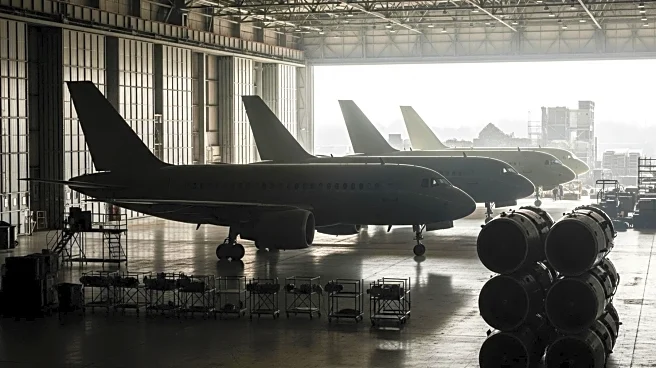What's Happening?
Four Airbus A320neo aircraft, previously operated by the Indian airline Go First, have been dismantled and recycled by the French company Tarmac Aerosave. These aircraft, now owned by parts trading specialist AerFin, are part of a growing trend of early teardowns in the aviation industry. Despite the A320neo family having an average age of just 3.76 years, accelerated engine inspections and upgrades have prompted these actions. The dismantling process began in June 2025, with each aircraft yielding approximately 1,400 parts. The engines, landing gear, and auxiliary power units were among the first components removed to facilitate quick remarketing. This initiative follows Go First's grounding in May 2023 due to issues with Pratt & Whitney geared turbofan engines, which led to a prolonged legal battle over aircraft maintenance and ownership.
Why It's Important?
The recycling of these relatively young aircraft highlights significant challenges within the aviation industry, particularly concerning engine reliability and maintenance. The early part-out of A320neos underscores the impact of technical issues on airline operations and asset management. For AerFin and Tarmac Aerosave, this represents an opportunity to capitalize on the demand for spare parts, especially in regions like Asia where AerFin plans to disassemble another A320neo. This trend could influence the strategies of airlines and lessors, prompting them to reassess the lifecycle management of their fleets. Additionally, the situation reflects broader industry concerns about the reliability of new engine technologies and their implications for operational efficiency and cost management.
What's Next?
AerFin has announced plans to acquire and disassemble another Pratt & Whitney GTF-powered A320neo in partnership with a Middle East investor. This aircraft, having completed its six-year maintenance check and engine overhauls, will be dismantled in Asia to meet local market demands. The ongoing issues with Pratt & Whitney engines may lead to further teardowns and recycling efforts, as airlines and lessors seek to mitigate risks associated with engine reliability. The aviation industry will likely continue to monitor these developments closely, as they could influence future aircraft design, maintenance practices, and investment decisions.










